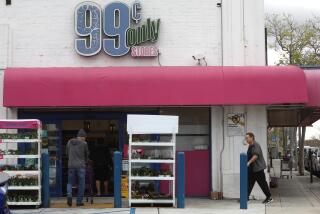Berryhill Offers Upbeat Farewell : State’s Farm Exports on the Rebound
California’s faltering agricultural exports, which dropped by nearly $1.4 billion after peaking in 1981, appear to be rising again, the state’s farm chief said Monday.
In one of his last appearances before stepping down this Friday after four years as director of the California Department of Food and Agriculture, Clare Berryhill brought an upbeat message to a Los Angeles Town Hall meeting at the California Museum of Science and Industry.
With the state’s first foreign trade offices opened this year, in Tokyo and London, California is in a better position to take advantage of the fall of the dollar’s value against the Japanese yen and European currencies, Berryhill said in an interview.
“Our export markets are beginning to show some signs of life,” he said.
The state’s agricultural exports, which totaled a record $4.2 billion in 1981, appear to have bottomed out at $2.83 billion in 1985, Berryhill said. Preliminary department estimates show that that 1986’s exports were closer to $3 billion.
California’s promotional efforts actually began several years ago with creation of the State World Trade Commission and appropriation of $5 million a year in export grants.
As part of this program, Berryhill in February and March led a contingent of state business executives on a 35-day voyage aboard the state-owned Golden Bear, calling at Manila, Singapore and Hong Kong as well as at Tokyo and Kobe, Japan.
One early indication of success came from Gallo Winery, Berryhill said. The Modesto company--the world’s largest winery--reported signing 11 new contracts as a result of the tour.
Moreover, the Wine Institute said California wines have increased their share of the Japanese market--dominated by European wines--from 5% two years ago to about 22%.
The new trade offices work with U.S. embassies and federal trade offices to help open foreign markets to American products and ensure that they stay open. California’s Tokyo office, for example, aided a Petaluma firm--Willie Bird Turkeys--to get its first shipment of smoked turkeys past an unexpected snag in Japanese customs, said Berryhill aide Lori Johnson.
The state is working with rice growers to penetrate the Japanese market, Berryhill said, saying Japanese consumers are increasingly chafing at the high cost of the heavily subsidized local product, which costs six times more than California rice.
Berryhill announced last month that he would step down as department director. No successor has been named.






